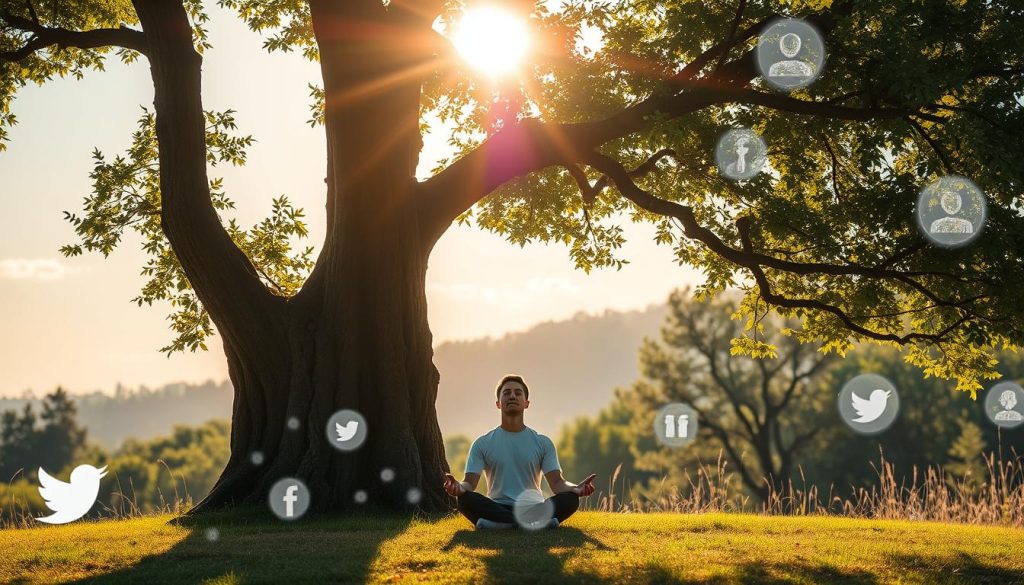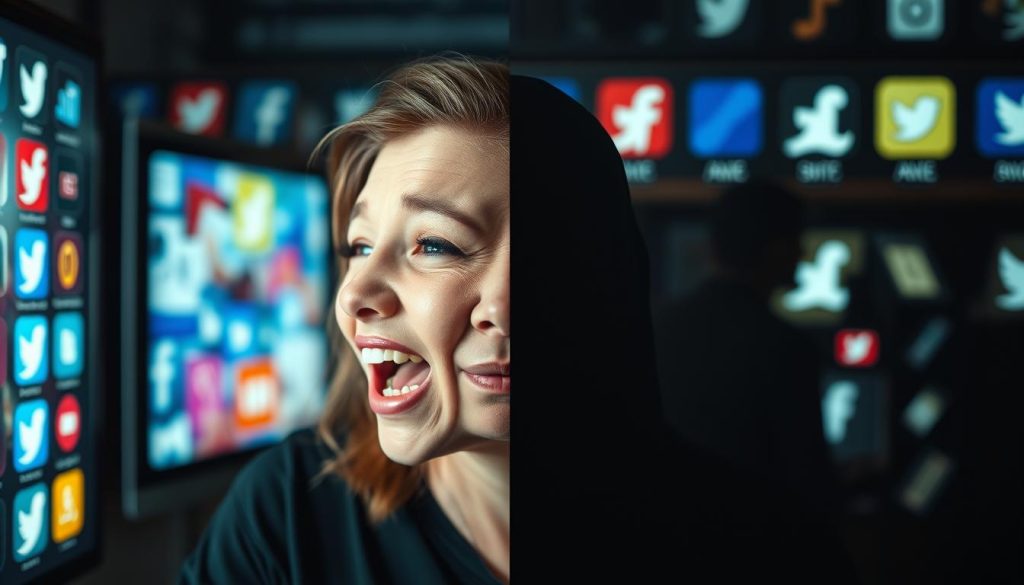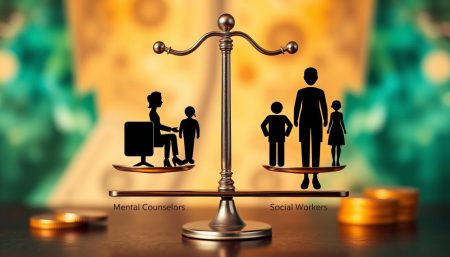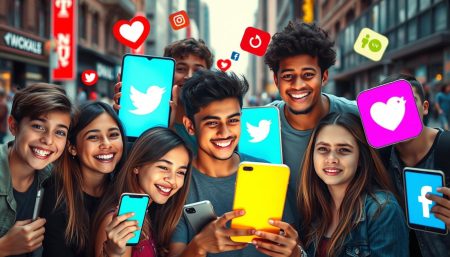Social media is now a big part of our lives. Studies show it can lead to more anxiety and depression. Experts say we need to understand how it affects our minds.
There’s a lot of data showing online interactions can hurt our mental health. This is true for many people, including those who face cyberbullying.
Social media has both good and bad sides for our mental health. It can help us connect and build communities. But it can also harm our mental state.
We need to learn how social media affects us. This will help us use it in a way that’s good for our minds.
Key Takeaways
- Correlation between frequent social media use and increased reports of mental health issues like anxiety and depression.
- Understanding the psychological impacts of online platforms is crucial for mental wellbeing.
- The persistent issue of cyberbullying on social media platforms has significant mental health ramifications.
- Insights from both empirical research and mental health experts inform strategies to mitigate negative online experiences.
- A broader discourse on social media’s role in shaping mental health is needed for individuals across all age groups and backgrounds.
Understanding the Impact of Social Media on Our Minds
Social media is very appealing, but it has deep effects on our minds. Studies have shown how it can lead to internet addiction, body image issues, and FOMO (Fear of Missing Out).
Research shows that social media activates our brain’s reward systems. Every notification or like gives us a small reward. This keeps us coming back for more, leading to addiction.
Leading psychologists say social media not only creates new mental health problems but also makes old ones worse. Seeing perfect images and lifestyles online can harm our body image.
FOMO, or Fear of Missing Out, is more than just a feeling. It’s a deep psychological issue. It makes us feel anxious when we think we’re missing out. This anxiety can make us check our social media constantly, deepening addiction.
- Cognitive processes linked to reward system activation
- Potential for developing internet addiction due to social media use
- Exacerbation of body image issues through constant exposure to idealized content
- FOMO-induced anxiety leading to increased social media activity
It’s important to understand these effects to use social media better. Knowing how it affects us helps us make healthier choices. It shows how our digital lives are connected to our mental health.
The Psychology Behind Social Media Anxiety
Social media is now a big part of our lives. It connects us but also brings stress from constant comparison and harassment. Knowing how it affects us helps us deal with the anxiety it causes.
Identifying Symptoms of Social Media-Induced Anxiety
It’s important to recognize the signs of anxiety from social media. Feeling overwhelmed or stressed from online interactions is common. Physical signs like a fast heart rate and headaches are also signs we need to address.
Strategies for Managing Anxiety in the Digital Age
Experts suggest several ways to handle digital stress. Mindfulness helps us see reality more clearly. Setting limits on social media and knowing what triggers our anxiety are also key.

| Strategy | Description | Benefits |
|---|---|---|
| Time Management | Allocating specific times for social media engagement and adhering to them strictly. | Reduces excessive exposure and helps maintain a healthy online-offline balance. |
| Digital Detox | Taking deliberate breaks from electronic devices. | Decreases dependency on digital validation and refreshes the mind. |
| Mindfulness Meditation | Practicing meditation to improve concentration and focus. | Enhances self-awareness and reduces the stress induced by social comparison. |
Link Between Social Media and Depression
Recent studies show a strong link between social media habits and mental health. They found that too much screen time can lead to depressive symptoms. Looking into how people use social media shows it can harm our emotional health.
More people are getting depressed as they spend more time on screens. This has led to important talks about how our digital lives affect our minds. Studies show that those who spend a lot of time on social media are more likely to feel depressed.
| Daily Screen Time | Incidence of Depressive Symptoms | Recommended Action |
|---|---|---|
| Less than 2 hours | Low | Maintain or reduce |
| 2-4 hours | Moderate | Monitor and manage |
| More than 4 hours | High | Seek guidance and reduce |
Many people share how too much social media made their depressive symptoms worse. Their stories show how our online actions can affect our feelings in real life.
Experts say it’s important to notice mood changes and know when to get help. Taking breaks from social media and spending time with people face-to-face can help our mental health. For more on managing mental health with social media, check out info on lobular breast cancer, which also needs early detection.
We need to find a balance between our online and offline lives. This means using technology in a way that helps our well-being, not hurts it. By understanding the connection between social media habits and depressive symptoms, we can use technology more wisely.
Cyberbullying and Its Effects on Mental Health
The digital age has brought many benefits but also dangers like cyberbullying. It harms the mental health of people worldwide. It’s important to understand this issue to find ways to cope and stay safe online.
The Rise of Online Harassment and Its Consequences
Cyberbullying cases have risen sharply, showing we need better online safety. The internet’s anonymity can make people act out without fear. This is especially hard for teens and young adults.
Experiencing cyberbullying can cause serious mental health problems. These include anxiety, depression, and stress-related disorders.

Support Systems and Resources for Victims of Cyberbullying
Both online and offline support groups are vital for those affected. Many organizations offer resources to help victims recover. They aim to build resilience and lessen the harm from online bullying.
| Resource | Description | Contact |
|---|---|---|
| National Cyber Safety Resources | Provides tools and guidance for dealing effectively with cyberbullying, including legal advice and counseling services. | National Helpline |
| Online Peer Support Forums | A platform for victims to share their experiences and support each other, fostering a community of help and hope. | Online Access |
| Tech Companies’ Initiatives | Specific programs and tools designed to detect and prevent bullying activities on social media platforms. | Service Support Lines |
To fight cyberbullying, we need community efforts, education, and strong online safety. We must balance technology use with awareness and education. This will help create a safer online space for everyone.
The Intricate Connection Between Social Media and Mental Health
Looking into how social media affects our mental health is complex. It involves understanding both its good and bad sides. Studies show that how social media impacts us can change a lot. This depends on how we use it and our own mental health.
The positive use of social media helps our mental health. It helps us connect and learn new things. This can make us more aware of ourselves and feel supported.
But, the negative impacts of social media are also big. It can make us feel not good enough, anxious, and sad.
- Increased accessibility to peer support and diverse perspectives.
- Enhancement of professional networking opportunities.
- Exposure to harmful content and unrealistic life comparisons.
- Risk of cyberbullying and its detrimental effects on mental health.
Talking to experts shows that we can keep our mental health good with social media. We can set limits, use privacy tools, and join positive groups online. Personal stories also show that social media’s effects can vary a lot.
It’s important to use social media in a way that’s right for us. While it can be very helpful, we need to watch out for its dangers.
Body Image Issues Fueled by Social Media
Social media shapes how we see body image. It often shows unrealistic beauty standards that hurt self-esteem. This can make people feel bad about themselves.

People who struggle with self-esteem talk about the harm of seeing perfect images. These images are often fake and make real bodies seem bad. This makes many feel bad about themselves.
This relentless exposure can profoundly affect what constitutes a positive body image and distort one’s perception of beauty to something far from reality.
But, there’s a movement to change this. Body positivity advocates are working hard. They want to show more real and diverse body images on social media. They aim to make beauty more inclusive.
- Promoting diverse and inclusive body images
- Challenging existing unrealistic beauty standards
- Advocating for mental health related to body image
They also suggest healthier ways to use social media. Following accounts that support positive body image and self-love is key. This helps build self-esteem and shows beauty is diverse. For more on mental health and images, check here.
Internet Addiction: Recognizing and Addressing the Problem
In today’s world, internet addiction is a big issue. Many people struggle with too much screen time. Knowing the signs of addiction is key to better internet habits and less screen time.
Defining Internet Addiction and Its Symptoms
Internet addiction means feeling a strong need to use digital devices. It can harm daily life, health, and relationships. Signs include spending too much time online, feeling bad without it, and neglecting important tasks.
Coping Mechanisms for Controlling Social Media Use
To fight internet addiction, there are helpful steps. You can set time limits, use apps to track your use, and find fun things to do offline.
Creating good internet habits needs awareness and action. Here’s a table with ways to cut down screen time and improve digital health:
| Strategy | Description | Expected Benefit |
|---|---|---|
| Digital Detox | Periodically disconnecting from all digital devices. | Reduces stress and improves personal interactions. |
| Set Usage Limits | Using apps to limit the amount of time spent on social media platforms. | Helps in moderating the time spent online, promoting time management. |
| Engage in Offline Activities | Partaking in hobbies that do not involve screen use, such as reading or sports. | Enhances physical health and reduces the reliance on digital stimulation. |
By managing your internet use, you can avoid the dangers of too much screen time. This leads to a more balanced life.
How FOMO Affects Our Mental Health and Social Behavior
Fear of Missing Out (FOMO) is more than just feeling left out. It’s a deep concern that others might be having more fun than us. This affects our mental health and how we act in social situations. Learning to overcome FOMO is key to better social interactions and less anxiety in our digital world.

Studies show FOMO is linked to feeling uneasy and unhappy. These feelings can lead to anxiety and depression. This happens because we constantly compare ourselves to others on social media.
Let’s explore how FOMO impacts our lives and mental health:
- FOMO makes us use social media more, as we scroll to see what others are up to.
- It can also harm our physical health by disrupting sleep, as we stay up late for updates.
- The need to be online all the time can make real-life interactions less meaningful.
- Feeling not good enough or unhappy can make us keep checking social media.
Psychologists suggest ways to beat FOMO. First, we need to know what triggers it and set limits on social media. Also, spending more time in real life can help us feel less left out and improve our mental health.
Here are some ways to enjoy social interactions without anxiety:
- Focus on being grateful for what we have, without comparing it to others.
- Make a plan for regular, in-person social activities to strengthen our connections.
- Use apps that help us control how much time we spend on social media.
By understanding FOMO and finding ways to overcome it, we can live a more balanced life. This life values real connections and supports our mental health, reducing anxiety caused by digital life.
Social Comparison on Social Networks: A Double-Edged Sword
Every time we scroll through social media, it’s like a silent battle for self-worth. This battle is made worse by the influence of our peers on these platforms. By understanding how social comparison works on social media, we can fight back against its negative effects.
Understanding Social Comparison Theory in the Context of Social Media
Social comparison theory says we judge our worth by comparing ourselves to others. On social media, we compare ourselves to perfect lives and achievements. This can make us feel bad about ourselves and change how we see success.
Mitigating the Negative Impacts of Social Comparison
To fight social comparison on social media, we need to focus on our own worth. We should try to see things more clearly and interact with others in real ways. This can help us not get caught up in comparing ourselves to others.
| Strategy | Description | Benefit |
|---|---|---|
| Awareness | Recognize triggers and patterns of negative comparison. | Reduces unhelpful scrolling and enhances self-awareness. |
| Reframing Thoughts | Transform comparative thoughts into reflections on personal growth and goals. | Shifts focus from others to self-improvement. |
| Limiting Exposure | Consciously reducing time spent on social media platforms. | Decreases opportunities for comparison and increases time for offline activities. |
The Psychological Effects of Online Harassment
Online harassment is a big problem in today’s world. It hurts people’s mental health all over the globe. The emotional distress from such experiences can cause lasting harm. It can change how people live and feel every day.

Victims often feel anxious, depressed, and scared for their safety. It’s key to learn how to deal with harassment to take back control of one’s emotions. Taking legal action against the harassers can also help. But, how well it works depends on the rules of online platforms and the justice system’s response.
| Response Strategy | Impact on Victim | Examples |
|---|---|---|
| Immediate reporting to platform | Varies by platform responsiveness | Twitter, Facebook moderation |
| Legal action | Potential for resolution | Restraining orders, lawsuits |
| Professional counseling | Improvement in mental health | Cognitive Behavioral Therapy |
| Community support | Reduces feeling of isolation | Online support groups, forums |
- Studies show that online harassment causes a lot of emotional distress for victims.
- Survivors say getting help from others and professionals is very important.
- Legal action can be a strong warning, but it’s not always easy to get or effective.
Digital platforms must do more to protect their users. They need to enforce strict rules to stop harassment. This is crucial for keeping people’s mental health safe online.
Screen Time and Its Effects on Mental Health
Recent years have seen a big jump in how much we use digital devices. This has raised big worries about its impact on our health, especially on our mental state. It’s important to understand how much screen time affects our mental health.
Studies from top schools have looked into these worries. A big study by Yale Department and Columbia School of Nursing found something important. It shows that kids who spend too much time on screens might get more anxious and depressed over time.
Guidelines for Healthier Screen Time Habits
To stay healthy online, we need to use technology wisely. Here are some tips from health experts to help us balance our online lives:
- Make rules for when you can’t use screens, like during meals or an hour before bed.
- Take breaks from screens when you’ve been using them for a long time to avoid feeling tired.
- Keep your bedroom screen-free at night to sleep better and feel mentally healthier.
Following these tips can help us and our families use digital devices in a healthier way. This can lessen the bad effects of too much screen time on our mental health.
Navigating Privacy and Personal Boundaries on Social Media
In today’s world, knowing how to keep your data privacy and personal space online is key. It helps you stay safe and healthy on social media. This way, you avoid stress and anxiety that comes with being online.
Experts say setting clear boundaries is vital. It’s about knowing how much info to share and with whom. Stronger privacy means a safer online world. By tweaking your privacy settings, you can dodge cyber dangers.
“Creating robust personal boundaries online is the first step towards safeguarding your mental and emotional wellbeing.” – noted a cybersecurity expert.
Those who keep their data private well face fewer online threats. They feel safer and more at peace. This shows how good online boundaries are for your mental health.
- Review privacy settings regularly
- Limit sharing of personal details like location and contact information
- Be selective about friend requests and follows
- Avoid oversharing personal experiences
Experts give simple tips to keep your online space safe. Each tip helps you control your online world better. This makes social media safer and more enjoyable.
By following these tips, you can enjoy social media without risks. You keep your personal space online safe and sound.
The Dangers of Instant Gratification on Social Media
Social media’s instant gratification is a big deal when we talk about digital life and mental health. These platforms are designed to give quick rewards. This can change how we act and feel.
The Impact of Instant Rewards on Mental Health
In today’s world, getting likes and shares fast can be addictive. It makes people choose digital over real-life connections. This can make us feel lonely and not good enough.
Long-Term Effects of the Pursuit of Instant Gratification
Chasing quick digital rewards can harm our happiness and mental health. It can make us always feel not happy enough. Our happiness starts to rely too much on social media.
Seeking deeper connections online and offline can help us feel better for longer. Doing things that make us happy, like being mindful or helping our community, can balance out the fleeting happiness from social media.
When Social Media Usage Crosses the Line: Warning Signs
In today’s world, seeing or experiencing too much social media is common. It can cause mental exhaustion and mess up our daily lives. It’s important to know when social media use is too much to keep our minds healthy and find a good balance online.
Indicators of Unhealthy Social Media Consumption
Spotting when you’re using social media too much is the first step to better digital habits. If you’re ignoring important life tasks for social media, that’s a sign. Feeling anxious or restless without it is another warning.
How to Establish Healthy Digital Boundaries
Setting limits on social media is key to healthier habits. Experts say to set times to check it, so it doesn’t get in the way of work or friends. Taking breaks from digital can also help you focus and feel less tired.
Here’s a simple way to balance social media usage:
- Choose specific times for social media, limit it to 30 minutes.
- Use social media like any task, with moderation.
- Turn off notifications to avoid constant checking.
- Make time for real-life talks to keep relationships strong.
| Tips | Benefits |
|---|---|
| Implement scheduled usage | Reduces the risk of addiction. |
| Turn off notifications | Decreases constant reminders and distractions. |
| Regular digital detoxes | Improves mental health and personal connections. |
By following these tips, you can lessen social media’s impact on your life. It helps cut down on excessive use and mental exhaustion. Setting and keeping these limits helps you use digital platforms in a healthier way.
Towards Healthier Social Media Habits: Tips and Practices
Keeping a healthy balance with social media is key for our mental health. Using mindful usage and self-regulation can make our online time more rewarding. Here are some tips to help you develop better digital habits.
- Set Specific Time Limits: Setting times for social media helps you stay in control and avoid endless scrolling.
- Curate Your Feed: Choose content that lifts your spirits and teaches you something new. This makes your online time more valuable.
- Engage More Meaningfully: By commenting, sharing, and posting valuable content, you build stronger connections and have more meaningful chats.
- Regular Digital Detoxes: Taking breaks from social media can refresh your mind and body.
- Use Tools for Mindful Usage: Apps that track your screen time and remind you to take breaks can help you stay healthy online.
By following these tips, you can improve your online interactions and protect your mental health from the negative effects of too much screen time.
| Practice | Benefits |
|---|---|
| Time Management | Reduces anxiety and increases daily productivity. |
| Content Curation | Improves mood and knowledge through quality content. |
| Meaningful Engagement | Builds stronger, more supportive online communities. |
| Digital Detox | Helps in mental clarity and reduces dependency on social media. |
| Mindful Usage Tools | Encourages self-regulation by monitoring online behavior. |
Conclusion
Social media’s impact on our mental health is huge. This article showed how it affects us. It talked about anxiety, depression, cyberbullying, and body image issues.
To make social media better, we all need to work together. We must create a healthier online space. This means building positive communities online.
Let’s take action to improve our social media use. We can set limits on screen time and have real conversations. Every small step helps protect our mental health in today’s connected world.
FAQ
Q: How can social media usage lead to depression and anxiety?
A: Studies show a link between too much social media and depression and anxiety. Seeing only the best parts of others’ lives can make us feel bad about ourselves.
Q: What are the psychological effects of cyberbullying?
A: Cyberbullying can cause a lot of emotional pain. It can lead to depression, anxiety, and lower self-esteem. Victims might feel scared, lonely, and even think about suicide.
Q: How does social media affect body image and self-esteem?
A: Social media often shows perfect images and lifestyles. This can make us feel bad about our bodies and lower our self-esteem. We compare ourselves to these ideals and feel not good enough.
Q: Can social media use result in addiction?
A: Yes, using social media too much can be addictive. Signs include ignoring personal life, always thinking about it, and feeling the need to escape. It can also make us feel a certain way and hide our addiction.
Q: What is FOMO and how does it affect mental health?
A: FOMO is the fear of missing out on fun events. It’s often caused by social media. It makes us want to stay connected all the time, which can harm our mental health.
Q: How can we manage social media-induced anxiety?
A: To deal with anxiety from social media, set limits on use, take breaks, and interact with people in real life. Focus on your own life and values, not comparing to others.
Q: What is the link between social media and depression?
A: Using social media a lot can lead to depression. It’s because of negative comparisons, bullying online, sleep problems, and less face-to-face time.
Q: How does social media use impact mental well-being?
A: Social media can be good for mental health by connecting us. But it can also make us feel lonely and pressure us to meet standards. It depends on how and how much we use it.
Q: What are the signs of unhealthy social media consumption?
A: Signs include spending too much time online, ignoring friends and family, feeling jealous or not good enough, and having trouble focusing.
Q: What strategies can help develop healthier social media habits?
A: To have healthier habits, be aware of how much time you spend online, choose positive content, and set times to check social media. Also, take breaks from digital devices.


















